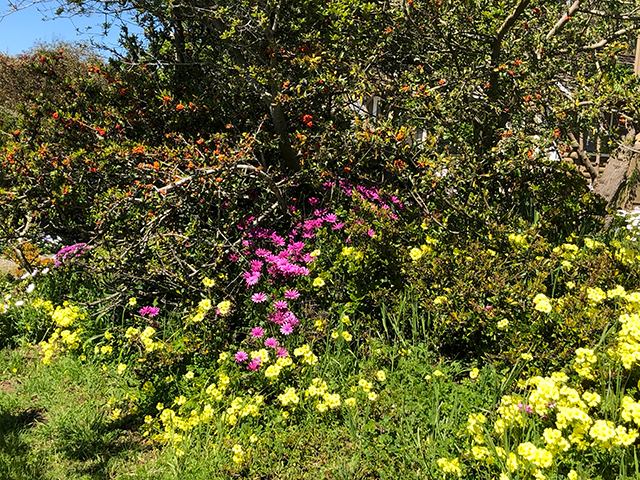Luke 13:1-9 The Gospel of Reprieve
Luke 13:1) At that very time there were some present who told Jesus about the Galileans whose blood Pilate had mingled with their sacrifices. 2) He asked them, “Do you think that because these Galileans suffered in this way they were worse sinners than all other Galileans? 3) No, I tell you: but unless you repent, you will all perish as they did. 4) Or those eighteen who were killed when the tower of Siloam fell on them—do you think that they were worse offenders than all the others living in Jerusalem? 5) No, I tell you: but unless you repent, you will all perish just as they did. 6) Then he told this parable: “A man had a fig tree planted in his vineyard; and he came looking for fruit on it and found none. 7) So, he said to the man working the vineyard, ‘See here! For three years I have come looking for fruit on this fig tree, and still, I find none. Cut it down! Why should it be wasting the soil?’ 8) He replied, “Sir, let it alone for one more year, until I dig around it and put manure on it. 9) If it bears fruit next year, well and good, but if not, you can cut it down.’”
Context of the Passage: This story takes place during Jesus’ final journey to Jerusalem. Jesus is aware of what awaits him in there. Because of that, all of his actions and teaching during this time have a great urgency to them. This urgency comes from his knowing that his time is short and his deep desire to communicate the good news to them before it is too late. In chapter 12 huge crowds flock to Jesus to hear his teachings. These teachings contain a number of messages about repentance, as well as warnings about the suddenness of God’s coming judgment. Jesus wants people to face the truth and make the needed changes before it is too late. Chapter 13 also continues the theme of repentance but adds new dimensions of mercy, grace and patience from God toward the people.
Why do bad things happen to good people? Verses 1-5 of this passage give us a glimpse of people trying to understand the meaning of evil and suffering in the world. Their questions are our own. Why do people suffer? Why is evil allowed to wreak havoc in God’s world? These verses recall two tragic events…9/11 type events in their day…that had affected both Galileans and Jerusalemites. One was an act of human evil, the other what we might call a natural disaster. The common understanding among the faithful of Jesus’ day was that there was a direct correlation between suffering and sin. So, the assumption of the crowd was that if these people had died, they must have been sinners and earned God’s judgment and wrath. Jesus turns that common understanding of tragedy, suffering and death on its head. He reminds the crowd that those who died were no worse as sinners than any others—all human beings are sinful! In fact, Jesus gives no real answer to the question “Why?” That does not seem to be the most important issue for him. For Jesus, the more compelling question is not, “Why do some suffer and die?” The question is, rather, what are you going to do with the gift of life that you have been given by God with all of its second chances?”
Parable of the Fig Tree: This story was especially effective in an agrarian society where life itself depended on the success or failure of the land and the crops. Trees that do not produce fruit simply take up space in good soil and should be cut down. There are many such stories of unfruitful tress in ancient Near Eastern literature. Jesus’ story is different from most in that mercy is extended mercy or a reprieve to the tree, giving it another chance to bear fruit. Still there is a warning of the urgency of the repentance and change if dire consequences are to be avoided. The life of the tree is extended but only for a limited time.
Word Study
Vs. 1 – Galileans whose blood Pilate had mingled with their sacrifices – There is no historical corroboration of this event in which Pilate murdered a group of Galileans while they were worshipping, but Josephus’ accounts of Pilate’s confrontations with the Jews confirms such bloodshed was not uncommon.
Vs. 3 - …but unless you repent, you will all perish as they did – The word perish here and in verse 5 is intended to represent more than physical death. Death is a metaphor. Without repentance and faith there is spiritual death. It is also a metaphor for the coming judgment.
Vs. 7 – cut it down - literally, ‘dig it out’
Why should it be wasting the soil – literally ‘exhausting the ground.’
Questions for Personal Reflection
1. Do you think of suffering as an act of God?
2. Think about receiving the gift of another year. How will you use this year for God? For the Body of Christ? How would you choose to use the last year of your life, if you knew it would be your last?
3. How does God’s Spirit work in your life to help you bear fruit?
4. What hampers your ability to bear fruit? What do you need in order to overcome these hindrances?
5. What does repentance mean to you?



